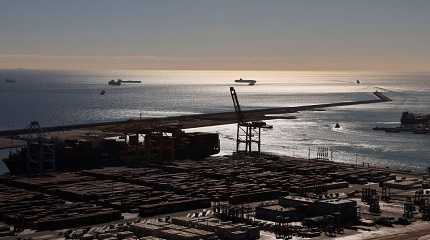
BARCELONA, Nov 7 (Reuters) - The Barcelona port stevedores' union has refused to load and unload any military material amid the war in Gaza and urged the protection of civilian populations in areas of conflict, following a similar move by Belgian transport unions last week.
The decision on Monday is mostly symbolic and seeks to encourage other Spanish ports to follow suit, the secretary of the OEPB union, Josep Maria Deop, told Reuters on Tuesday.
The OEPB is the only union representing the 1,200 stevedores at Barcelona's port.
Deop said organisations promoting peace could help the union figure out which containers contain military equipment. He said he was convinced there were military shipments from Barcelona because "it's a port that moves all types of goods".
It wasn't clear what those organizations were and whether they had agreed to help the union in these efforts.
Barcelona's port authority declined to comment and said it did not have data on military shipments.
Israel has been targeting Hamas military operations in Gaza in the wake of the Oct. 7 attacks by Hamas Islamists on Israeli towns that left 1,400 people dead and 240 abducted. The retaliatory attacks by Israel have killed over 10,000 people, health officials in Gaza say.
Spain exported military equipment worth 1.3 billion euros ($1.39 billion) in the first half of 2022, with shipments to Israel amounting to 9 million euros, according to the latest available official data.
Spain does not plan to export any lethal military equipment to be used in the conflict between Israel and Hamas, state news agency EFE cited government sources as saying last week.
The OEPB said it opposed all types of violence wherever it happens, including in Israel and the Palestinian territories, and that its boycott seeks to protect civilians anywhere.
"No cause justifies sacrificing civilians," it said.
Barcelona's dock workers adopted a similar boycott in 2011 due to the conflict in Libya. They also took part in humanitarian aid shipment projects for Western Sahara and Nicaragua in recent decades.




